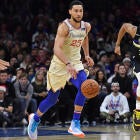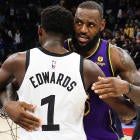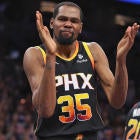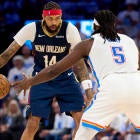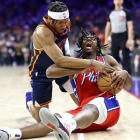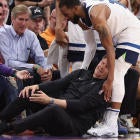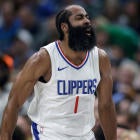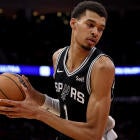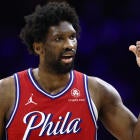Ben Simmons is having another All-Star season. He's probably a top-five Defensive Player of the Year candidate, at least, and the 76ers are rolling along at 23-10 after a statement 121-109 win over the Milwaukee Bucks on Christmas. But there are causes for concern. Entering Christmas Day, the Sixers were just 14th in the league offensively, and that ranking drops to 25th in the fourth quarter when the court, and game, really tightens.
Inevitably, this ongoing conversation about Philly's inherent offensive issues always comes back to Simmons and his inability, or unwillingness, to shoot anything that even resembles a perimeter shot. Four percent of Simmons' shots this season have come from the long mid-range or three -- meaning 96 percent of his shots are basically in the paint, or maybe slightly outside, per Cleaning the Glass.
It gets tiring to keep talking about this, but it's a big deal.
Shooting, and the spacing that comes with it, could be the one thing standing between the Sixers and a championship. Simmons is the key to all of this. He's taken just 14 shots all season that would qualify as jump shots, nine of which have been in the short mid-range, per Synergy. That leaves five 3-pointers, two of which he has made -- the only two made 3s of his career to this point.
All summer there was footage flowing of Simmons making 3-pointers from all over the court in open-gym settings. Optimism that he would at least attempt to grow his game in this regard abounded. It hasn't happened, and until it does, questions about whether this Sixers team can reach its ceiling with Simmons -- his elite defense and playmaking notwithstanding -- on the floor, particularly playing alongside Joel Embiid, will remain as inevitable as they are tiresome.
On Christmas Day, before their win over Milwaukee, Sixers GM Elton Brand was asked about, for lack of a better description, the Simmons shooting problem. Here's the exchange (via Kyle Neubeck of the Philly Voice):
Reporter: How do you create an environment conducive to success in the playoffs for Joel if Ben doesn't shoot?
Brand: Ben's going to do more than his fair share defensively, passing the ball, 17 assists [against Detroit on Monday], and we can be creative. But I think he's going to unlock some other things with his spacing, we're going to put him in places on the court that Joel and the rest of the team can be successful. It's a good question, but we're not concerned.
Reporter: He doesn't seem to space all that much.
Brand: Right.
Reporter: If it's the regular season, wouldn't it seem like the time to work on that?
Brand: It's a great point, if it's not going to happen in the regular season, it's the time to work on it, it won't happen later on in the season or in the playoffs. But it's a work in progress, which I've probably said that five times already, but it's true. And once he gains the confidence and realizes that's a high percentage play for the team and for us, maybe not that game, but 10 games down the line, 20 games down the line, we'll be fine. He'll be fine.
If you read all of Brand's comments, you'll see that he initially tried to dance around the question with company responses like the Sixers are going to be "creative" with how they use Simmons and where they put him on the floor, and of course, he prefaced his answer by calling attention to all the other great things Simmons does on the court as a playmaker and defender, which are true.
But that doesn't change the shooting problem in a matchup-based playoff series where weaknesses are exploited mercilessly, and when pressed on that problem, Brand effectively conceded.
"[Simmons[ is' going to unlock some other things with his spacing," Brand said.
"[Simmons] doesn't seem to space that much," the reporter countered.
"Right," Brand said.
And there you have it. You can try to explain this issue away, but it's not going anywhere. And to Brand's point, the regular season is where Simmons should be working on this part of his game, trying to gain comfort and confidence, because if you won't/can't shoot jumpers, even on occasion, in a random game in December, you're certainly not going to do it in a playoff game in May.
It needs to be noted that the Sixers offense is 8.4 points per 100 possessions better when Simmons is on the floor, per NBA.com. In fact, the Sixers' 111.4 offensive rating when Simmons is playing is the best mark of any of their starters. But you can't pay too much attention to these numbers, particularly in this case. After all, the numbers also say the Sixers are 6.2 points worse per 100 possessions defensively when Simmons is on the floor.
It's crazy to think the Sixers are a better defensive team without Simmons. That might be as misleading of a statistic as you'll find, and to some degree, the number that says the Sixers are significantly better offensively with Simmons on the court might also be misleading. When he's not playing with Embiid and you put shooting and athletes around him and crank up the pace, he can be great. And he's talented enough to make the best of a imperfect situation even alongside Embiid.
Just look at the Christmas win. Simmons finished with 15 points, 14 assists, seven rebounds, three steals and two blocks on 7 of 10 shooting. The Sixers played incredible. Wiped the team with the best record in the league off the floor. Personally, I wouldn't count the Sixers out of any series, against any team, just for their sheer talent. But in the deep playoff rounds, everyone has big-time talent. Matchups are what matter. Weaknesses are as impactful as strengths.
Through that lens, wins in December, whether against Milwaukee or anyone else, have little forecasting value. In the playoffs, while Simmons' defense and playmaking will continue to be a hurdle Philly opponents have to overcome, his shooting will continue to be something the Sixers themselves have to overcome if they want to win or even compete for a championship.













